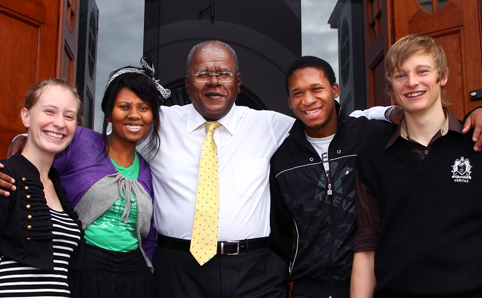 |
|
From the left are: Elri Marais, Palesa Mafisa, Prof. Jonathan Jansen, Vice-Chancellor and Rector of the UFS, Goodwill Shelile and Foster Lubbe. Gabriela Schroder and Saeed Abdullah were absent when the photo was taken.
Photo: Hannes Pieterse
4 April 2012
|
As part of the University of the Free State’s (UFS) comprehensive suite of student leadership development programmes, a strategic partnership with Stanford University, USA has been forged.
Starting in 2012, selected cohorts of high-potential second-year students will annually participate in the Stanford Sophomore College Programme. The UFS and Oxford University in the UK are the only non-Stanford participants in this strategic and unique opportunity.
Following a highly competitive selection process based on both written and oral assessment, managed by the UFS Centre for Teaching and Learning and the Office of the Vice-Chancellor, the first group of six students was recently selected and will visit Stanford University from 1 – 14 September 2012.
The exclusive and high profile Sophomore College has been offered at the prestigious Stanford University on the West Coast of the US for a number of years. It takes the form of a residential summer programme for second-year students who participate and engage in intense academic exploration with peers and professors on a variety of innovative, multidisciplinary topics.
Depending on the course selected, students participate in a variety of intellectual and academic programmes, do research, work in labs, engage in readings of texts and develop presentation skills.
Some courses are held in part or entirely off campus. Advisory sessions to assist students in their preparation, academic orientation and intellectual development will be conducted prior to their departure to add value to the experience at Stanford.
The students will benefit from the programme in many ways, among others the intense academic exploration of topics with an eminent international scholar, immersion in and exploration of a field of interest, the opportunity to hone critical habits of mind, train to become a more engaged and entrepreneurial learners and collaborate and form relationships with friends and peers.